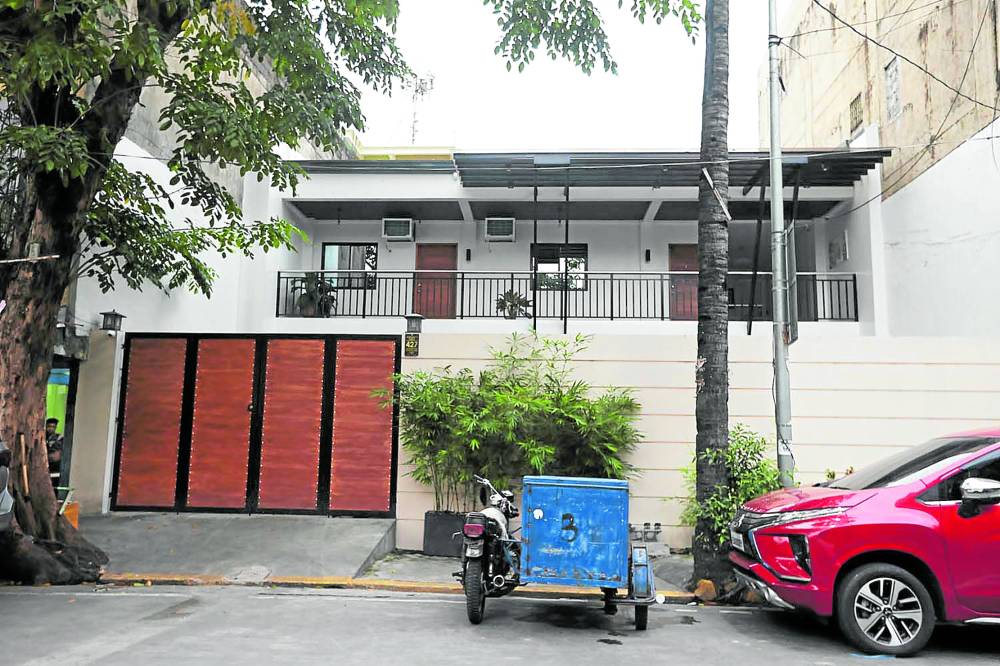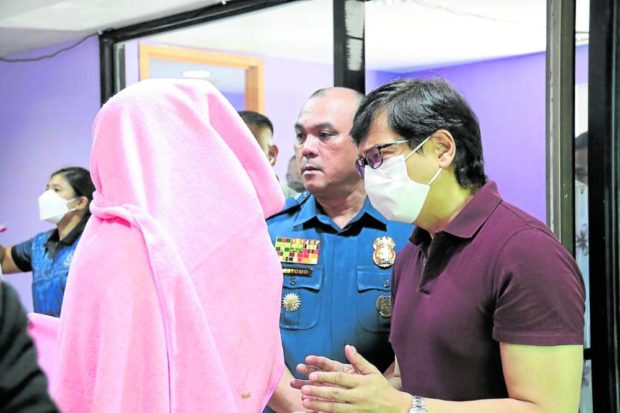15 kids saved from cybersex den ‘run’ by 2 teen girls – PNP

RESORT AS COVER Fourteen girls and a boy were rescued from a cybersex den supposedly being operated by a 17-yearold and her 18-year-old accomplice, police said. Authorities on Thursday raided this pool resort in Sampaloc, Manila, where the illicit activities allegedly took place. —NIÑO JESUS ORBETA
MANILA, Philippines — Fifteen children were rescued from a cybersex trafficking operation allegedly being run by two young women—both in their teens themselves—at a resort in Manila on Thursday, police said.
Arrested were a 17-year-old girl, who was tagged by the police as the “mastermind,” and her alleged 18-year-old accomplice, during an entrapment operation at the private pool resort located in the city’s Sampaloc district, authorities said.
The raid was led by Interior Secretary Benhur Abalos and National Capital Region Police Office (NCRPO) chief Brig. Gen. Jonnel Estomo.
According to the NCRPO, the victims, all girls except one, and whose ages range from 13 to 17, were made to perform sex acts on a webcam in front of foreign clients for a P10,000 fee.
The suspects and the victims were brought to the Women and Children Protection Center at the NCRPO headquarters at Camp Bagong Diwa in Taguig City, for documentation and proper disposition.
Juvenile justice
The suspects will face charges for violation of child trafficking and cybercrime laws while the investigation continues, the police said.
Under the juvenile justice law, an 18-year-old suspect may be prosecuted as an adult, but a 17-year-old, being above 15 but below 18, is considered exempt from criminal liability and subject to an intervention program, “unless he/she has acted with discernment, in which case, such child shall be subjected to the appropriate proceedings.”
In a separate operation in Caloocan City on Wednesday, the police rescued two students, age 13 and 16, who were alleged victims of online sexual abuse and exploitation by their own parents, neighbors and guardians.
According to a statement from the Philippine National Police, the suspects either sold video recordings of the children being exploited or streamed it online for foreigner-clients.
The rescue operation was launched based on a tip relayed by the Antipolo City Social Welfare and Development Office.
According to Abalos, the Marcos administration is taking a tough stance on cybersex trafficking and other illegal activities, especially involving children.
“These kinds of crimes are very disturbing, and the worst of its kind as they target and victimize innocent children. The impact of cybersex crimes on children have long-term effects on them and oftentimes, ruin their lives,” he said.
Last month, the Department of the Interior and Local Government (DILG), together with the Department of Social Welfare and Development (DSWD), the Department of Justice (DOJ) and the Department of Information and Communications Technology (DICT) held a joint press conference to stress their coordinated action against cybersex operations.
Safe space
“We have to take seriously these kind of crimes preying on our children online and end sexual exploitation by strengthening our campaign against cyberporn and providing them safe space online, now that they are more exposed to activities done virtually in light of the restrictions brought by the pandemic,” Abalos said.
“With the help of the DOJ, DSWD and the DICT, we can intensify our initiatives on tracking down cybersex dens and be able to save our children and minors from the abuse and danger,” he added.
He urged the public to report suspected child predators and any suspicious activity to the DILG or the PNP hotline.
In June, the Cybercrime Investigation and Coordination Center (CICC) reported a year-by-year increase in cases of online sexual abuse and exploitation of children (Osaec) activity in the Philippines since 2019, which officials said were made worse by the pandemic lockdowns.
Linus Antonio, technical consultant of the CICC, said the country had become a “producer” of child sexual abuse materials (CSAMs) being tracked by the Cybertipline of the US National Center for Missing and Exploited Children.
In 2019, of 16 million sexual abuse materials logged by the group, 5 percent, or more than 801,000, was traced to the Philippines.
By 2020, however, it had increased to 1.3 million (up by 62.3 percent); and by 2021, it grew further to 3.1 million (138.5 percent).
“The problem is real. And it’s disturbing to say the least,” Antonio said.
He pointed out that the issue of Osaec should be a concern not only of the CICC, saying that “as a whole, as a nation, we should tackle this problem.”
